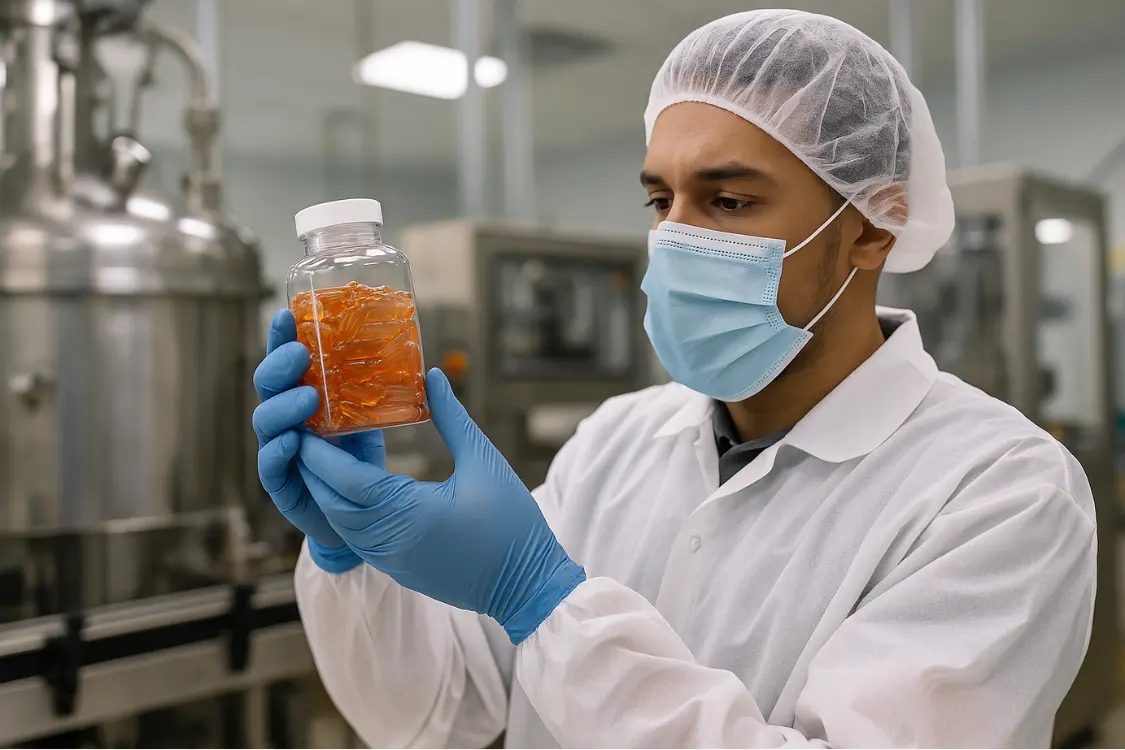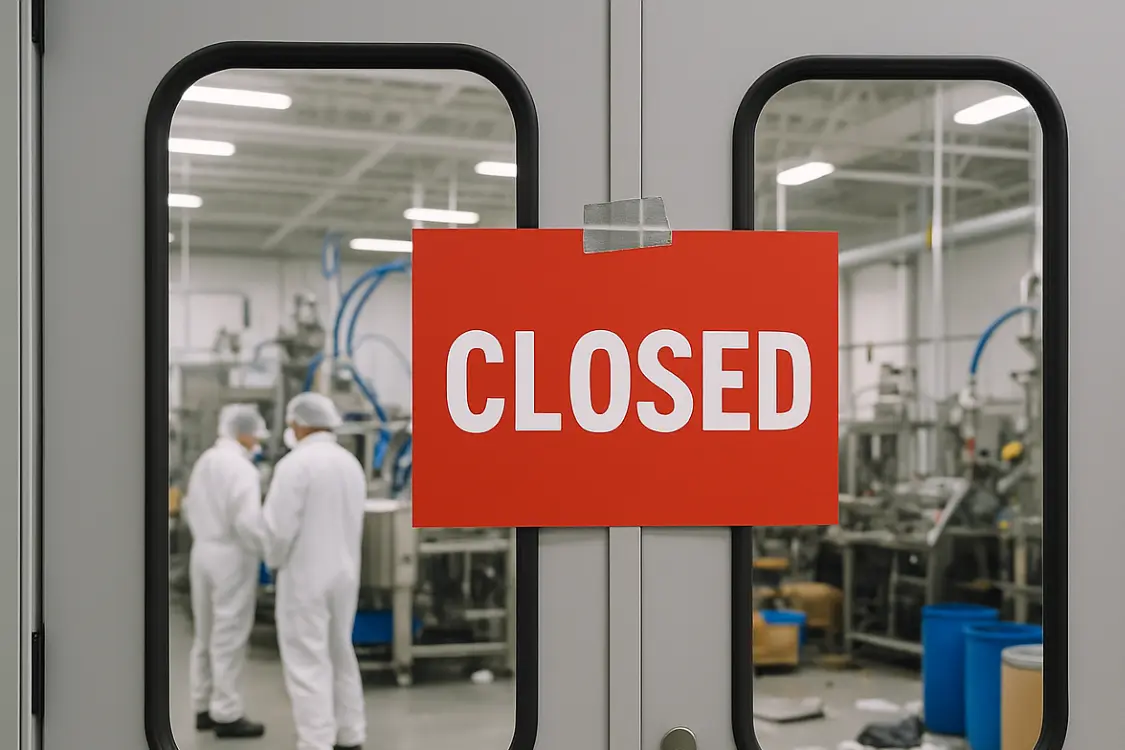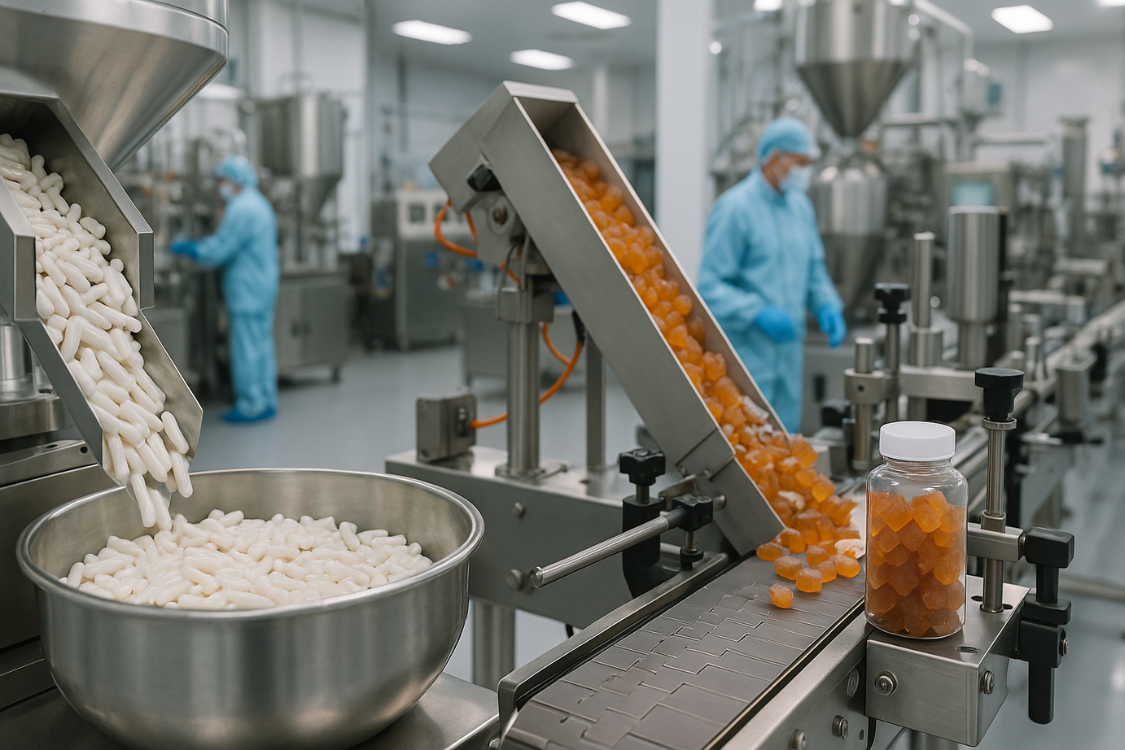Can you really trust a supplement manufacturer without knowing how they operate?
Prequalification isn’t just a formality. It’s a necessary step to ensure the safety, quality, and compliance of the products your brand offers. Skipping this process can lead to serious problems, including unsafe ingredients, production delays, or costly product recalls.
When a manufacturer fails to meet the Food and Drug Administration’s (FDA) Current Good Manufacturing Practices (cGMP) regulations or lacks effective corrective and preventive actions, the risk extends beyond just one batch. It affects your brand’s reputation, customer trust, and ability to remain in business.
Without proper laboratory evaluation, even a well-formulated supplement can fall short in performance or safety. In middle-income countries, where regulatory oversight may vary, following strict prequalification requirements becomes even more critical.
This article breaks down the risks of bypassing the supplement manufacturer prequalification process and why investing in it protects both your products and your business.
What Is Supplement Manufacturer Prequalification?
Prequalification is the process of vetting a supplement manufacturer before entering into an agreement. It helps ensure the company can produce high-quality products that meet industry standards while reducing the potential for safety issues or compliance failures.
Before any vitamin, capsule, or powder is formulated or shipped, a manufacturer must be evaluated for compliance, safety, and the ability to meet prequalification requirements. This step is often the difference between reliable output and costly issues down the line. It also plays a critical role in determining the long-term viability of a supply chain program.
Definition and Purpose
In supplement manufacturing, prequalification is a critical part of assessing a facility’s ability to deliver safe, consistent, and effective products. It’s not just about the finished goods; it covers the entire manufacturing process, from sourcing raw materials to laboratory evaluation, packaging, and distribution.
Companies that skip this process risk partnering with manufacturers who don’t meet the FDA’s Current Good Manufacturing Practices (cGMP) regulations or fail to follow guidelines for continued compliance. This can result in weak documentation, poor oversight, and a higher chance of regulatory failure.
The purpose is to ensure the manufacturer has the systems, people, and protocols to produce vitamins, powders, or capsules that are safe and ready for market. It also helps reduce the likelihood of poor quality, contamination, or delivery delays. Most manufacturers will require a fee for a full prequalification audit or submission review, especially for more complex production operations or those exporting to regulated markets.
Key Components
A complete supplement manufacturer prequalification process involves evaluating multiple factors to help ensure the manufacturer can consistently deliver high-quality and safe products that meet specifications. Each of these components plays a critical part in confirming their ability to meet compliance and prequalification requirements, especially for brands operating in middle-income countries or across multiple locations.
Here are the key components to review:
- GMP certification and adherence to Good Manufacturing Practice
Confirms that the manufacturer follows industry-recognized standards for safe and consistent product output. - Facility conditions and site standards
Includes inspections of the manufacturing site layout, equipment cleanliness, staff hygiene, and environmental controls. - Corrective and preventive actions
Evaluates how the company identifies, manages, and resolves production issues to maintain quality and continued compliance. - Review of formulation records and quality documents
Ensures that each product is made according to its intended design, with proper documentation for traceability and verification. - Inspection history and performance reports
Offers insight into how the manufacturer has handled audits, past issues, and regulatory guidance in different locations.
These areas form the foundation of a trustworthy prequalification process and help businesses collaborate with manufacturers that meet global requirements. Brands that get this right are often proud to share the quality behind their products, knowing they’ve built a strong foundation from the start.

The Dangers of Skipping Prequalification
Skipping prequalification can lead to unsafe products, legal issues, and lasting damage to your brand. Once a supplement is produced, the risk is already in motion if your manufacturer hasn’t been properly vetted.
A poor manufacturing process doesn’t just affect product quality. It puts your entire supply chain at risk, especially if preventive actions and post-market surveillance are weak or nonexistent.
Compliance Issues
Working with non-compliant manufacturers can result in regulatory penalties, blocked imports, or forced shutdowns. The FDA has strict regulations, and any facility that fails to adhere to them puts your company at risk. These penalties don’t just cost money; they slow your ability to scale and reduce market access.
Product Recalls
If a supplement is made with the wrong formulation or contaminated ingredients, it can trigger a recall. That means lost revenue, refunding orders, and damage to customer confidence. Once a product leaves the facility, you’re responsible for it even if the problem started during manufacturing.
Recalls tied to unqualified manufacturing sites also attract regulatory attention, which may affect your ability to procure future goods or move through the submission process for new programs.
Legal Liabilities
When consumers get sick from supplements, the legal fallout can be serious. Failing to prequalify a manufacturer opens the door to lawsuits over safety issues. Courts often look at the steps taken before a product was released. If there’s no documented prequalification, it becomes harder to defend your company’s actions.
This is also the case for other regulated products like medical devices or in vitro diagnostic products, each of which has its own specific regulatory oversight and safety standards.
Brand Reputation
One mistake from a manufacturer can undo years of brand-building. If a supplement is unsafe, poorly made, or recalled, your customers won’t care who produced it. They’ll associate the issue with your label. Inconsistent performance, sloppy packaging, or compliance concerns hurt brand image and drive away future business.
Prequalification protects your name by ensuring your products are produced by qualified teams that follow proper guidance and can prove they meet regulatory and quality requirements.

Regulatory Requirements and Prequalification
Regulations around supplements are strict, and prequalification helps companies meet them before problems arise. It’s a step that connects directly to staying in good standing with regulators.
Ignoring these requirements can affect access to certain markets, especially where rules differ across locations or product types.
FDA Guidelines
The FDA requires that supplement manufacturers follow specific regulations, including those for accurate labeling and Current Good Manufacturing Practices (cGMPs) that require manufacturers to establish and follow procedures to ensure the identity, purity, strength, and composition of their products. Prequalification ensures your manufacturer understands and follows these guidelines.
When the FDA investigates unsafe products, it reviews all steps, including prequalification, documentation, and the handling of submissions. Not having this in place can lead to warnings or forced corrective actions.
cGMP Standards
Current Good Manufacturing Practices (cGMP) are legally mandatory for U.S. dietary supplement manufacturers. They outline how facilities must be run to ensure clean, safe, and effective products. A manufacturer must show proof of adherence to these standards during the prequalification process.
cGMP covers everything from employee training to inspections, cleaning protocols, and equipment maintenance. It’s the core of any good manufacturing process, especially for companies producing vitamins or dietary supplements.

Steps to Effectively Prequalify a Supplement Manufacturer
A thorough prequalification process helps reduce risk and ensure consistent product quality. It’s a smart way to protect both your investment and your customers.
Each step provides valuable information about how the manufacturer operates and how reliable their systems are.
Background Checks
Start with research. Look into the company’s history, certifications, and compliance record. Request documents that show prior performance, including any corrective and preventive actions they’ve taken in the past. Make sure they meet prequalification requirements in all locations where they operate.
Check if the manufacturer has been involved in recalls or failed inspections. That history can signal future risks.
Facility Audits
Visiting the facility offers insights that documents alone can’t provide. Pay attention to how clean the space is, how materials are stored, and how staff handle formulation and production. If an in-person visit isn’t possible, request virtual tours or third-party audit reports.
Look for proof of continued compliance and how GMP standards are applied day to day.
Quality Assurance Protocols
Ask about internal quality systems. How are products tested before they leave the plant? Are laboratory evaluations done regularly? What happens when a batch fails?
These answers reveal how seriously the manufacturer takes product safety and performance.
References and Testimonials
Talk to other companies that collaborate with the manufacturer. Honest feedback from past or current clients can tell you what to expect. Look for signs of clear communication, timely deliveries, and strong post-production support.
Reputation matters, especially when products are procured on tight timelines.

Case Studies: Consequences of Skipping Prequalification
When companies rush into agreements without vetting their manufacturers, the results can be costly. Even one mistake can ripple through an entire program.
Real examples help illustrate why prequalification is not optional.
Real-World Examples
One U.S.-based wellness brand sourced a vitamin blend from an overseas manufacturer without checking their facility. The product later failed a third-party laboratory evaluation, revealing contamination with heavy metals. A full recall followed, along with damage to the brand’s online reputation and a six-figure loss.
In another case, a startup entered a formulation agreement with a factory that had never passed a full GMP audit. Poor performance and inconsistent dosing led to a wave of refund requests and canceled retail deals.
Lessons Learned
In both cases, the companies skipped key steps like facility audits, document review, and qualification checks. With simple changes, like verifying prequalification requirements and inspecting the manufacturing site, they could have avoided the fallout.
Prequalification doesn’t just lower risk. It provides a foundation for long-term success, helping your brand provide high-quality products that meet every requirement from day one.
Prioritize Prequalification to Safeguard Your Business
Vetting your supplement manufacturer is not just a procedural step. It’s a strategic move that protects your product quality, brand reputation, and long-term business success.
Skipping supplement manufacturer prequalification creates serious risks. These can include failed compliance checks, product recalls, legal issues, and lasting damage to customer trust.
Reliable manufacturers follow Good Manufacturing Practice, maintain safe and organized manufacturing sites, and keep clear records to show continued compliance. Their processes reflect a commitment to safety, quality, and accountability.
Take the time to review certifications, inspect the facility, evaluate quality protocols, and reach out to current or former clients for feedback.
Making prequalification an integral part of your supply chain is one of the most effective ways to ensure your supplements are safe, consistent, and ready for market.
Frequently Asked Questions
What does supplement manufacturer prequalification involve?
It involves checking a manufacturer’s certifications, facility standards, quality systems, and history to ensure compliance and product safety.
How can skipping prequalification affect my supplement business?
Skipping prequalification can lead to recalls, legal issues, compliance violations, and damage to your brand’s reputation.
What are the key steps in prequalifying a supplement manufacturer?
Core steps include background checks, facility inspections, reviewing GMP adherence, and verifying quality control practices.
Are there regulatory requirements for supplement manufacturer prequalification?
Yes, manufacturers must meet FDA and cGMP guidelines, and prequalification helps confirm they meet those standards.
How often should I reassess my manufacturer’s qualifications?
Reassess annually or whenever there’s a change in the manufacturing process, location, or ownership to ensure ongoing compliance.
References
- Code of Federal Regulations. (2007). Part 111—Current good manufacturing practice in manufacturing, packaging, labeling, or holding operations for dietary supplements. Title 21, Chapter I, Subchapter B. U.S. Government Publishing Office. https://www.ecfr.gov/current/title-21/chapter-I/subchapter-B/part-111
- Jairoun, A. A., Shahwan, M., & Zyoud, S. H. (2020). Heavy Metal contamination of Dietary Supplements products available in the UAE markets and the associated risk. Scientific reports, 10(1), 18824. https://doi.org/10.1038/s41598-020-76000-w
- U.S. Food and Drug Administration. (n.d.). Questions and answers on dietary supplements. https://www.fda.gov/food/information-consumers-using-dietary-supplements/questions-and-answers-dietary-supplements#:~:text=FDA%20regulations%20require%20dietary%20supplement,the%20net%20quantity%20of%20contents
- U.S. Food and Drug Administration. (n.d.-b). Recalls of foods & dietary supplements. https://www.fda.gov/food/recalls-outbreaks-emergencies/recalls-foods-dietary-supplements



